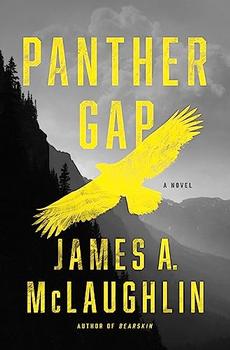Summary | Excerpt | Reviews | Beyond the Book | Readalikes | Genres & Themes | Author Bio

A Novel
by James A. McLaughlin
"Now," his father said.
He moved fast, crawling on his hands and feet, hunched over, trying to move like a wolf would. He thought wolf-thoughts and loped across the barn floor. He moved in a straight line and didn't turn. A wolf that turned to fight would make the eagle flare and break off the chase. The wolf was only vulnerable when he was running away.
He felt himself change, a little. It puzzled him.
When the eagle hit, it felt like his father had whacked him with a baseball bat instead. His breath went out and he collapsed facedown, his arms protecting his head and face.
He was supposed to hold still, pretend the first impact had knocked him out, not buck and jerk like a wolf trying to get away. That would be too dangerous, would bring on more killing from the eagle.
Still, she footed him, her first and second talons piercing the pad and pulling and then driving down again, through his skin, between his ribs, and into his chest, teaching Bowman a new kind of pain, an opening up, his guts pricked and held. A boundary so perfect and inviolate that he had never known it was there, broken now, dissolving, as if the eagle had reached inside him and was holding his heart, ungently, intimately. Later he would read that this sort of experience was called a unitive trance, and it was usually brought on by hallucinogenic drugs, extreme religious fervor, or near-death experiences. It didn't often happen to eleven-year-old boys.
His father was speaking. A hollow voice, miles distant. "Are you okay?"
He nodded, not wanting to say anything out loud, to break the wolf illusion.
"Now hold still, let her feed for a moment."
She felt heavier than her fourteen pounds as she shifted, adjusting her grip and picking at the chicken necks. His right side felt punched where the one foot still held him, the other on the wolf's head while she fed. That's the way she was supposed to do it: one foot on the body, driving the two primary talons into vital organs and compressing the lungs, the other on the head to control the wolf's defensive bite.
He had been a wolf for a moment, and now, with the eagle holding him, as he started to bleed internally from two puncture wounds, he was the wolf, and he was the eagle as well. He knew them both. He floated up and impossibly away from his body. He'd read about people claiming to have done this, but had always thought it sounded ridiculous, something they would invent to make themselves seem more interesting. Yet there he was, lying on the barn floor, his point of view unquestionably suspended in the air above, watching as his father approached.
Alecto was mantling, her wings spread protectively over him, shielding her prey.
His father spoke to the eagle in a small voice, in a language Bowman no longer understood, carrying a folded blanket he would use to cover and hide his son as soon as he coaxed the eagle away.
* * *
Leo Girard felt an unaccountable foreboding. The short flight had been perfect but Alecto had gone high-strung now. She hissed and glared at him over her shoulder, holding her immense wings out over Bowman. There were no wolves to hunt within a thousand miles, but Alecto was large and fierce enough to take one, and Leo thought he might try her on coyotes later in the winter, when the snow was deeper.
"Easy, big girl."
Leo's great flaw as a falconer was his desire to please his eagle. He knew this, and he fought it, but the little concessions he made had led to a relationship with the bird that was less than ideal.
He would walk out to check on Alecto at night, his boots crunching in the snow, and when he opened the heavy plank door her head was already turned in expectation, eyes shining with reflected moonlight, eyes larger and heavier than Leo's own. He would stand in front of the perch, the eagle's dark form silent, fluffed into a caricature against the cold, and he would feel her looking into him until the things he'd done and seen, the great love he'd lost, his nagging, desperate worry for his children's fraught future, the lives he'd taken, the soul sickness of his already too-long life, it all shrank to insignificance. On still winter nights he stared into those glinting black orbs, thinking there should be some kind of sound emanating from them, a low thrumming hiss like a river in flood. Alecto's eyes were silent in the same way a meteor arcing across the sky was silent, impossibly silent, as if the watcher must have suddenly gone deaf.
Excerpted from Panther Gap by James A. McLaughlin. Copyright © 2023 by James A. McLaughlin. Excerpted by permission of Flatiron Books. All rights reserved. No part of this excerpt may be reproduced or reprinted without permission in writing from the publisher.
Your guide toexceptional books
BookBrowse seeks out and recommends the best in contemporary fiction and nonfiction—books that not only engage and entertain but also deepen our understanding of ourselves and the world around us.